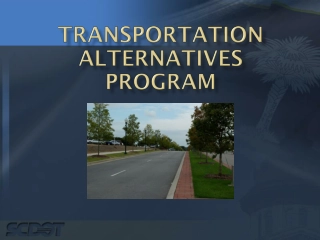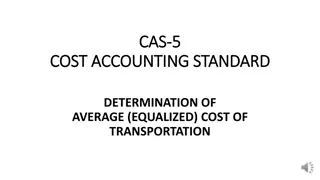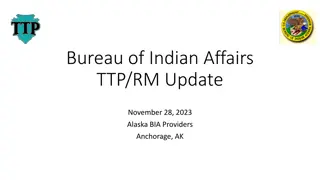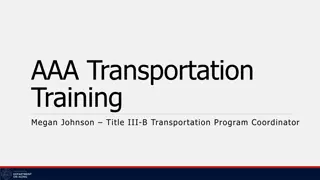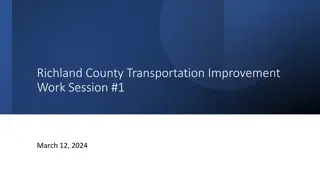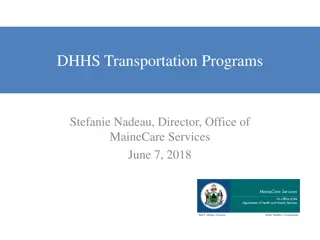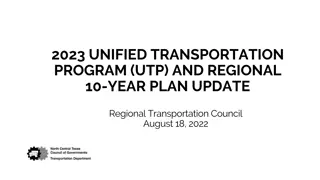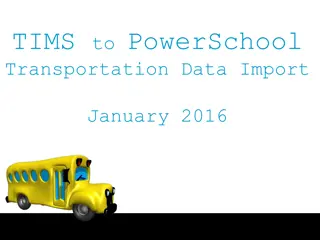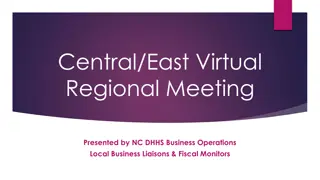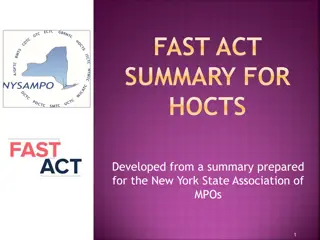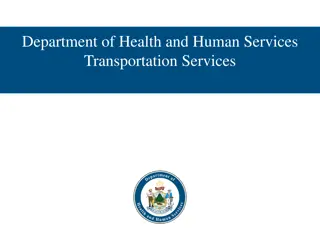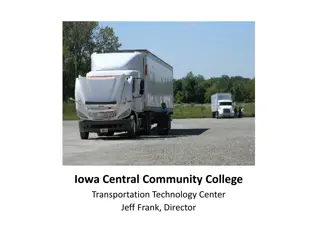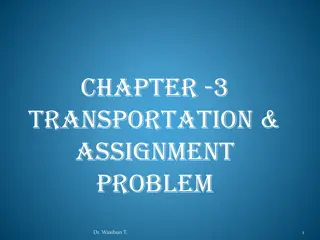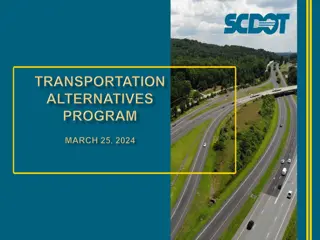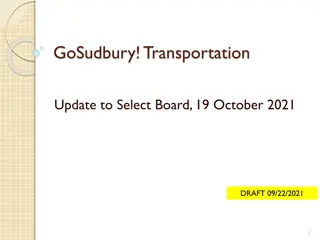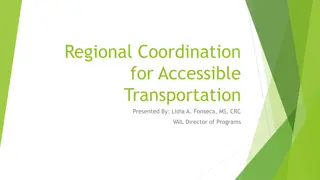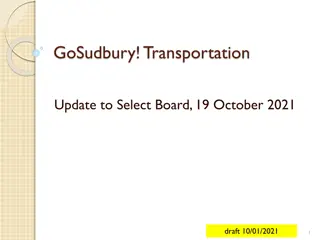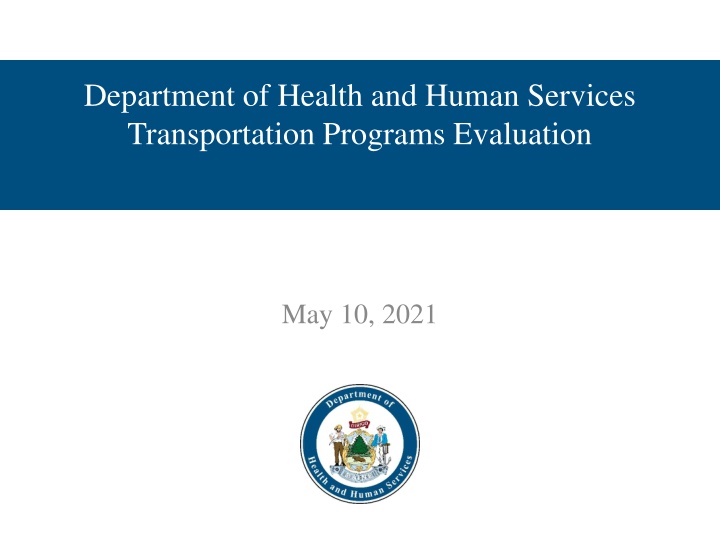
Evaluation of DHHS Transportation Programs and Recommended Solutions
Explore the evaluation of Department of Health and Human Services (DHHS) transportation programs, including key components, challenges, and recommended solutions for improving service quality and efficiency. Stakeholder feedback, cost-effectiveness assessment, and review of similar programs in other states are highlighted. Addressing service reliability, communication issues, and no-show incidents are among the key focuses for enhancing transportation services in Maine.
Download Presentation

Please find below an Image/Link to download the presentation.
The content on the website is provided AS IS for your information and personal use only. It may not be sold, licensed, or shared on other websites without obtaining consent from the author. If you encounter any issues during the download, it is possible that the publisher has removed the file from their server.
You are allowed to download the files provided on this website for personal or commercial use, subject to the condition that they are used lawfully. All files are the property of their respective owners.
The content on the website is provided AS IS for your information and personal use only. It may not be sold, licensed, or shared on other websites without obtaining consent from the author.
E N D
Presentation Transcript
Department of Health and Human Services Transportation Programs Evaluation May 10, 2021
DHHS Transportation Programs Evaluation Background Review of all DHHS transportation programs Key components of the project Assessment of quality of transportation services Assessment of barriers to access transportation services Recommendations for improvements Office of Child and Family Services (OCFS) Office of Behavioral Health (OBH) Office of MaineCare Services (NET) Maine Department of Health and Human Services 2
Key Evaluation Components Gather stakeholder feedback about service quality, and program management and oversight Determine if NET is cost effective and compliant with CMS rule Review similar transportation programs in 10 other states for best practices, delivery systems, performance, quality, and accountability measures Assess how MDOT policies and practices impact access to NET Maine Department of Health and Human Services 3
Challenges Identified Five Challenges to Performance and Cost 1) Service Reliability 2) No Shows 3) Communication between brokers, transportation providers, health care providers, and beneficiaries 4) Education and information about transportation policies and procedures for health care providers and beneficiaries 5) Service efficiency Maine Department of Health and Human Services 4
Recommended Solutions Challenges Recommended Solutions Continue to monitor missed trips, on-time performance. Create a shared (controlled access) database for brokers and providers. OBH and OCFS will monitor on-time performance and missed trips separate from cancellations. Service Reliability OBH, NET, and OCFS will monitor and investigate reports of missed appointments. The Department will monitor complaints and resolutions NET broker reports will break-out on-time performance for scheduled and unscheduled trips for the dashboard reports. Maine Department of Health and Human Services 5
Recommended Solutions Challenges Recommended Solutions Clarify communication protocols for all programs No Shows Create an easy-to-read summary about no-show policies and distribute it Review the no show policy during all eligibility interviews Maine Department of Health and Human Services 6
Recommended Solutions Challenges Recommended Solutions Brokers will schedule periodic meetings with NET Advisory Committees for the purpose of matching transportation availability with health care and human services provider appointment schedules. Sample completed trip logs to check for unnecessary redundancy in trip assignments. Communication Scheduling /dispatching software and automatic vehicle locator (AVL) systems between the Department and DOT. Brokers provide AVL for all providers and scheduling software (or bridge software). Create a central database for all NET, OBH, OCFS rider profile information. Maine Department of Health and Human Services 7
Recommended Solutions Challenges Recommended Solutions Require Brokers to participate in transportation stakeholder groups (i.e., Moving Maine) and Coordinated Human Services Public Transportation Plans. Create a central location for information about all transportation services that are funded by the Department Education and Information Consider opportunities for the central information location to be expanded to include DOT transportation providers and other services. Require brokers to include a case worker or other representative identified by the beneficiary in the complaint/appeals process Maine Department of Health and Human Services 8
Recommended Solutions Challenges Recommended Solutions Transportation Efficiency Implement a cost allocation methodology that supports ridesharing across multiple programs. Maine Department of Health and Human Services 9
Goals Three Primary Goals Goal 1: Maintain effective program oversight and remain compliant with 42 CFR Section 457.1206. Goal 2: Facilitate transportation access to beneficiaries through enhanced use of technology. Option A: Portal for Transportation Providers and Brokers Option B: One-Call/One-Click Center for Information and Hand-Off or Scheduling that includes Department, Health Care Provider (directly operated), and DOT transportation programs Goal 3: Establish the most effective organizational structure for delivery of services. Option A: Status Quo plus Improved Performance Measures and Oversight (Goals 1) Option B: Statewide NET Broker Model Option C: Statewide NET Broker Coordinated with Public Transportation Option D: Regional NET Broker with Regional Coordinators Maine Department of Health and Human Services 10
Oversight and Compliance Overall, NET is in compliance with its 1915(b) waiver. Goal 1 Maintain and enhance oversight Maine Department of Health and Human Services 11
Goal 1 - Oversight and Compliance Recommendations Missed Trips Continue to monitor and adjust standards Standardize monitoring practices across all Department programs No Shows Continue to work toward better communication with the rider and health care providers Note: A combined 20% of scheduled trips are either cancelled by members/or are no shows Maine Department of Health and Human Services 12
Goal 1 - Oversight and Compliance Recommendations Completed/Missed Trips by Destination Monitor for patterns and look for failures of providers to complete trips as scheduled by time of day and destination Complaints Implement a standard process to verify that complaints are appropriately resolved by the brokers. Include a process for specific types of complaints (e.g., wrong vehicle types being assigned, missed trips, on-time performance) Maine Department of Health and Human Services 13
Questions? Laura Brown RLS & Associates, Inc. lbrown@rlsandassoc.com Roger Bondeson Director, Division Of Operations roger.bondeson@maine.gov Maine Department of Health and Human Services 14

